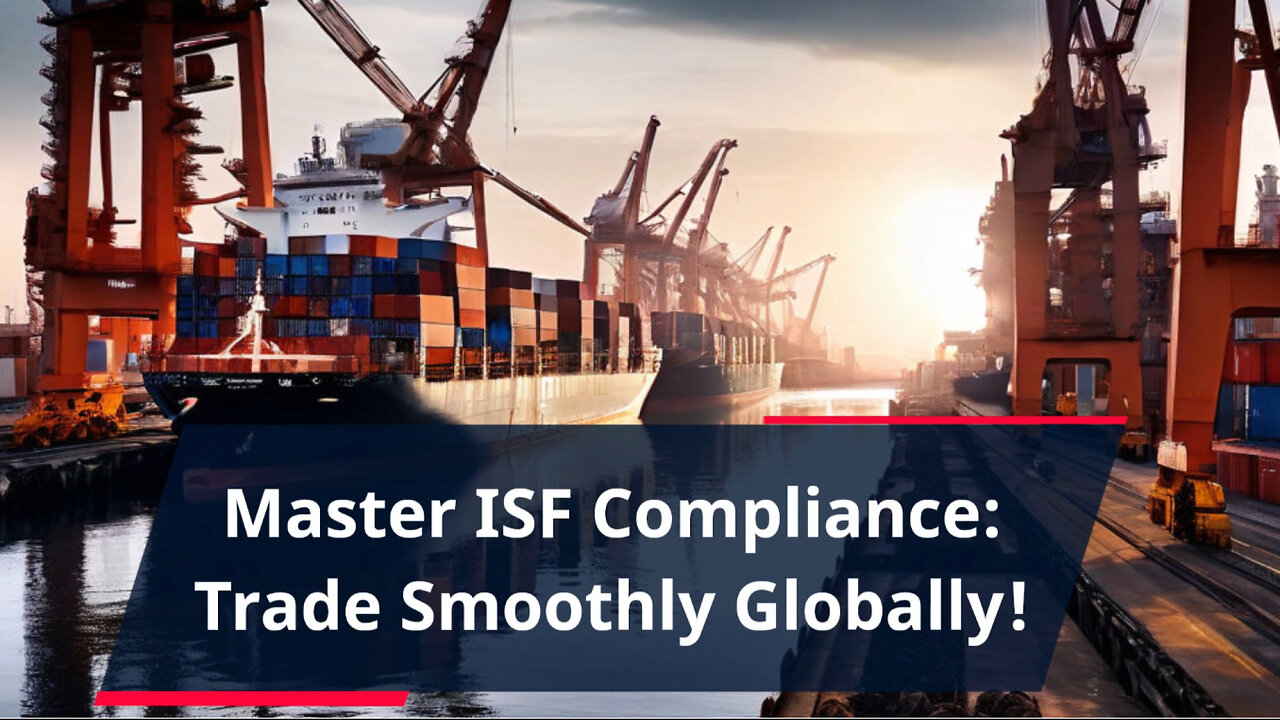Premium Only Content

Mastering ISF Compliance: Best Practices for Importers and Customs Brokers
ISF Checklist || 805-970-7918 || contact@isfchecklist.com || www.isfchecklist.com
In this video, we discussed the important concept of Importer Security Filing (ISF) and its role in enhancing supply chain security. We also touched on the requirement of customs bonds and their significance in guaranteeing importer compliance with customs regulations.
To ensure ISF compliance, it is essential to submit accurate and timely filings to CBP, at least 24 hours before the shipment is loaded onto a vessel bound for the United States. Failure to comply with this requirement can result in penalties, shipment holds, or denial of entry.
Maintaining a comprehensive checklist for ISF compliance is another critical best practice. This checklist should include all the necessary data elements required by CBP, such as importer and consignee information, bill of lading number, and container stuffing location. Doing so ensures that all required information is accurately captured and submitted.
Effective communication with supply chain partners is also key. Establishing clear lines of communication with suppliers, freight forwarders, and other parties involved in the supply chain helps ensure timely acquisition of necessary information and quick dissemination of any changes or updates.
Non-compliance with ISF requirements can lead to various consequences, including monetary penalties, increased scrutiny from CBP, shipment delays, and even loss of import privileges. Therefore, maintaining a high level of compliance is vital to avoid disruptions to the supply chain.
Engaging the services of a professional customs brokerage firm can greatly simplify the ISF compliance process. Customs brokers possess the expertise to navigate the complex landscape of international trade and customs regulations. They can assist with accurate and timely filing, help resolve compliance issues, and provide valuable guidance throughout the importation process.
In conclusion, understanding ISF compliance and implementing best practices is crucial for importers and individuals in the customs brokerage industry. By adhering to the requirements, maintaining clear communication, and engaging professional assistance, importers can ensure smooth and compliant international trade operations.
#usimportbond
#isfcustomsbroker
#uscustomsclearing
#isfentry
Video Disclaimer Here: This video is purely educational and has no ties with the US government.
00:34 - Understanding ISF Compliance: ISF (Importer Security Filing), also known as 10+2, is a requirement by U.S. Customs and Border Protection (CBP) that mandates importers and carriers submit specific data elements to enhance supply chain security and ensure smooth trade operations.
01:32 - Best Practices for Compliance: Key practices include timely and accurate ISF filing at least 24 hours before shipment loading, maintaining a comprehensive compliance checklist, and fostering effective communication with supply chain partners to gather necessary information and updates.
02:55 - Consequences of Non-Compliance: Failing to comply with ISF requirements can lead to penalties, shipment delays, increased scrutiny from CBP, and potential loss of import privileges, highlighting the importance of adhering to compliance measures and considering professional customs brokerage services for support.
-
 1:21:03
1:21:03
Russell Brand
3 hours agoBREAK BREAD EP. 13 - WESLEY HUFF
88.7K5 -
 UPCOMING
UPCOMING
Game On!
32 minutes agoRoger Goodell is FURIOUS at NFL fans who think Mahomes gets special treatment!
-
 10:31
10:31
Melonie Mac
1 hour agoMy Fantastic Four Movie Trailer Impressions
5303 -
 2:08:22
2:08:22
The Quartering
5 hours ago20,000 Feds QUIT, DOGE Workers Lives At Risk, Trump Vs Dept Of Education, Brie Larson Based & More
80.8K52 -
 1:23:15
1:23:15
vivafrei
18 hours agoLive with Enrique Tarrio! Jan. 6 Lawfare ON STEROIDS! Proud Boys & Beyond!
83.5K30 -
 DVR
DVR
Savanah Hernandez
2 hours agoEl Salvador offers to take in U.S. prisoners while Elon’s autists take on the deep state
6.64K4 -
 7:12
7:12
Tactical Advisor
4 hours agoBudget 2011 That Uses Glock Mags?! | Fusion Firearms 2025
9.89K -
 58:19
58:19
Ben Shapiro
4 hours agoEp. 2131 - Trump and Musk Bring The CHAINSAW
84K48 -
 1:12:31
1:12:31
Russell Brand
5 hours agoTrump’s Trade Wars: Power Plays and Global Repercussions – SF531
103K36 -
 29:57
29:57
The Finance Hub
3 hours ago $4.61 earnedBREAKING: DONALD TRUMP JR. JUST DROPPED A MAJOR BOMBSHELL!!!
29.2K15